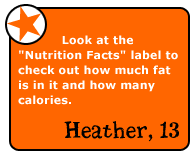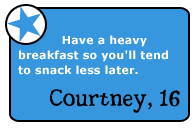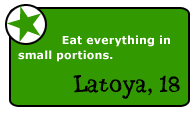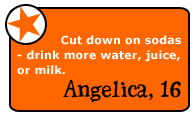Your Secrets to Healthy Snacking
Everyone knows that some foods are better snacking choices than others. What's not so easy in real life is putting all the stuff we know about healthy snacking into practice. In other words, it's tough to balance those "oops, I know I should only have a little bit of this but I just ate the whole bag" munchies with the healthy foods we know we should be eating.
We decided to ask our readers how they make healthy choices and avoid out-of-control snacking. More than 1,000 13- to 18-year-olds took our online snacking survey and told us how they manage to snack in a healthy way, even when it's hard to do. Here are their tips.
Knowing What to Eat
More than two thirds of the survey-takers said that when they choose a snack they think about how healthy it is (or isn't). That's impressive. Awareness of what's good for you and thinking about your choices are the first steps in making healthy snacking choices.
Plenty of our respondents are doing more than just thinking about healthy snacking choices, though — they're making them, too. More than a third said the snacks they choose most often are health-conscious ones (such as whole-grain crackers, yogurt, fruits, and veggies).
But many who said they think about what they're choosing still find it's not always possible to eat the healthiest snack. That's understandable. Unfortunately, it can be all too easy to give in to a craving or to eat what's easiest to get your hands on when you're really hungry.
Some of our readers said that planning ahead and making sure they have the right stuff on hand can help them make healthy choices when their snacking willpower is low.
Sally, 16, says, "Stocking your fridge with healthy foods will help you get to or stay at a healthy weight. Pigging out on healthy foods feels a lot better than pigging out on cake or another food that is supposed to be eaten in moderation."
Rosie, 14, offers this advice: "Instead of eating unhealthy foods because it's convenient, plan ahead and prepare tasty, healthy foods."
Alena, 16, agrees. "If you have food with you and plan when you will eat, you don't get as hungry and aren't tempted to resort to convenience food from vending machines or fast food."
For many of you, managing your munchies may come down to managing your parents: "A lot of parents buy their kids bad food," says Stephanie, 13. "Ask them to get some healthy food you will enjoy just as much."
Knowing How to Eat
Some of these successful snackers make it sound easy. But it's not always a piece of cake (ha-ha!) to snack well. Most of our survey-takers fessed up and revealed that the types of snacks they like most often are sweet or salty junk foods (such as cookies, ice cream, candy or chips, popcorn, and pretzels).
So how do you begin to snack smarter when there's so much temptation out there?
Many readers talk about giving in - but in moderation. Karni, 14, says, "It's OK to eat unhealthy snacks once in a while, but make sure you balance and eat healthy snacks too."
Lots of people agree with Karni that it's important to treat yourself to the fun stuff - as long as you don't overdo it. And they're right. Thinking of foods as "bad" or "off limits" can even lead to eating problems. Everyone deserves to indulge occasionally.
Angelica, 16, says, "Eat healthy. But from time to time, give yourself something less healthy that you really like. If you deny yourself everything that doesn't meet a healthy standard, you won't be happy, and one day you're going to come home and pig out."
George, 13, offers this idea: "Eat healthy Monday to Friday, then on the weekends you can eat treats."
Lindsay, 14, offers a work-for-your-snacks approach. "Only take one at a time, that way you have to walk over to get another one every time."
Tia, 13, thinks about how her food choices relate to her fitness and performance. "I don't eat that much junk food because I play sports. Junk food just makes me hungry and gain more weight."

When it comes to smart snacking, thinking about how much you're eating as well as what you're eating is wise. More than half of the people in our survey (57%) said they think about the amount they're eating when they snack.
Many of you also know that people tend to eat less if they really focus on what they're eating. As Hannah, 13, says, "Slow down! Enjoy the food that you are consuming!"
Good advice! So appreciate every bite. Focus on taste, texture, and temperature. Notice how spicy a food is. Or how fruity it tastes. That way you'll really enjoy how smooth (or crunchy), how tangy (or naturally sweet), or how refreshingly cold (or soothingly warm) the food you're eating is. And when you slow down you'll also notice when you start to feel full.
Bryan, 14, advises, "Before you eat, ask yourself, 'Am I really hungry?' Don't eat directly out of the bag/box. Pour some of your snack into a bowl (or put it on a plate) and put the bag/box away. Eat the snack out of the bowl instead of out of the bag. This will help limit the amount you eat."
Knowing Why You Eat
Like lots of readers, Bryan recognizes that people eat for reasons other than hunger. Knowing why you're snacking — because you're bored, for example, or because you've skipped a meal and let yourself get way too hungry — can help to rein in overeating.
Is It Hunger — or Something Else?
About half of the people who took our survey told us they usually snack because they're hungry, which is great. But the other half said they snack for emotional reasons, like boredom, stress, or anger (42%), or because they're hanging out with snackaholic friends (4%).
Kara, 13, says she eats because "I'm bored and everyone else is eating."

Most of you realize that eating for emotional reasons isn't a great idea. "Snacking because of boredom is a good way to add some bad pounds, so be careful what you eat, when you eat, and why you eat it," says Naomi, 13.
Krystin, 13, says, "Don't eat out of boredom or stress. I eat because of stress sometimes and I am fat for my age."
Claire, 13, says, "The most important thing to do is not just eat out of boredom. If you are bored, go outside and do something!"
Getting variety in your diet is one way to avoid overeating. As Isadora, 14, says, "Be creative, it keeps you from being bored."
Becky, 15, offers this advice: "Learn to think of food as fuel, not comfort."
Are You Too Hungry?
Just about all of our survey takers said they snack after school — either when they get home (77%) or before their after-school activities like practice, games, or lessons (22%).
After-school snacks are a good idea, especially if you had an early lunch or dinner is hours away. If you choose right, snacks can help you focus on your homework — not your grumbling tummy. But if you come home from school so ravenous that you reach for the first thing in sight, that can be a problem.
People who skip meals or wait until they're too hungry often eat more than they actually need to satisfy their hunger. And this can lead to weight gain. Healthy snacking between meals can come in handy as a way to manage hunger before it gets totally out of control.
Tia says she snacks when she's "not that hungry but hungry enough to eat something little."
Austin, 14, says, "Eat smaller meals throughout the day, then you don't binge eat all at once."
What's the best way to manage hunger? Having three meals a day and a snack (if needed) at regular set times, such as after school.
Are You Multitasking?
Blair, 14, says that snacking "gives me something to do with homework." Unfortunately, eating at the same time as doing something else is a bad idea. As with any kind of multitasking (doing more than one thing at a time), you're not really focused on your food. And that can lead people to eat way more than they intended.

Emily, 16, says, "Do NOT eat in front of the TV. And try to limit your overall TV watching."
"Television usually makes kids hungry," says Krystal, 13.
What about when you're hanging out with friends? Heather, 14, says, "If I do snack when I'm out with friends, I try to follow the two limit rule, like only taking two bites, or taking only two cookies, so that I'm not eating when I'm not hungry."
Your Choice? An Apple a Day!
So what are our survey-takers' healthy faves? When it's time to pick something healthy to snack on, the apple came out a hands-down favorite. Even those who don't see themselves as healthy snackers can deal with apples — like Wesley, 13, who admits, "I don't eat too many healthy snacks (blush!). But when I do select something healthy I usually pick an apple or a yogurt."
Marshelle, 13, wrote that her favorite snack is "apples with a little bit of peanut butter on them."
This snack turns out to be a favorite for many of you. And people who choose apples with peanut butter get a round of applause from nutrition experts. Not only do these two foods offer some great nutritional benefits, but combining proteins (like peanut butter) with carbohydrates (like fruit) offers more staying power. That's because protein can keep you energized long after the carbs are used up.
Shaaziya, 14, chooses "fruit, yogurt, and cereal," which is another great way to balance protein and carbs.
Rafael, 13, says, "I usually choose a banana or a green apple. Sometimes I eat an orange. I'm not into vegetables that much."

Many of you do like vegetables, though. Cut-up vegetables like carrots, celery, broccoli, and cauliflower were a popular snack when drizzled with low-fat dressing or paired with low-fat dip. Vegetables even satisfy Matthew, 15, who admits that for him, "Eating vegetables is not fun. Sometimes they can be gross. However, selecting a favorite topping and dip really puts flavor into the vegetable and satisfies hunger."
Snacking on fruits and vegetables is a great way to make sure you get the five servings a day that you're supposed to.
Many of the people who took our survey said they enjoyed smoothies, cereal, granola bars, protein bars, and nuts. These foods can all be healthy choices. But if you're snacking on them, be careful. Foods like cereal, granola bars, or energy bars can be loaded with fat or sugar. Check the label for information to see how much you can realistically eat. And if you're making your own smoothies, choose low-fat milk and hold the sugar — if you add fruit, it'll be naturally sweet.
Enjoy It!
Perhaps these snacking ideas give you some inspiration on new things to try. Go ahead and experiment. You may discover new likes — along with some definite dislikes. Courtney, 13, tried a little extreme experimentation and sent us this advice: "Never eat pickles and milk. Yuck!"
Jared, 16, sums it all up nicely. "If you want to stay healthy, just stay smart! Know what to eat and when you should eat — for example, what nutrients you need each day. This is a lifelong process. Start learning."
Reviewed by: Mary L. Gavin, MD
Date reviewed: October 2011
Note: All information is for educational purposes only. For specific medical advice, diagnoses, and treatment, consult your doctor.
© 1995-2024 KidsHealth ® All rights reserved. Images provided by iStock, Getty Images, Corbis, Veer, Science Photo Library, Science Source Images, Shutterstock, and Clipart.com


